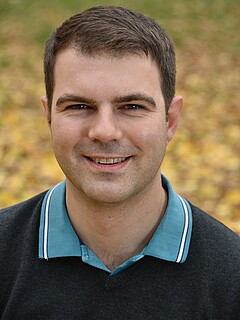PhD students 2nd cohort

Dr. Christian Kamleiter
Curriculum Vitae
Christian Kamleiter (born 1989) studied evangelical theology from 2008 to 2015 in Neuendettelsau, São Leopoldo (Brazil) and Berlin. During his studies, he was a member of the student’s union executive committee (AStA) of the Augustana Hochschule in Neuendettelsau (2010) and was a working student at the ecumenical centre Mission EineWelt (2015 to 2016). After the first theological exam of the Evangelical-Lutheran Church in Bavaria (ELKB), he completed his traineeship as a pastor from 2016 to 2018 in Lauf an der Pegnitz. He has been a voluntary pastor of the EKLB since September 2018.
PhD project
The Relationship between Subjectivity and Intersubjectivity in Rudolf Otto's Theory of Religion
The theologian Rudolf Otto is best known for his theological work “The idea of the Holy” published in 1917. He also showed a significant interest in developing a concept of religion that can serve as a stable foundation for a theology able to respond to the problems of modernity. The currency of this problem is the reason behind Otto’s increase in popularity in German evangelical theology in the last twenty years.
The dissertation presumes that Otto ties into specific romantic ideas, motives and concepts in various ways. Especially the innovative language he uses for his phenomenology of the religious is reminiscent of romantic approaches to the crisis of language. These consequences of modern fragmentation continue to influence the arts and theology to this day.
Well-known romantic motives, such as the mysterious, the ineffable, or also the romantic concept of feeling can be found in Otto’s idea of religious feeling in which the irrational, transcendental manifests. This dissertation will analyse the role these romantic aspects play in Otto’s thinking.
Otto’s contemporaries also noticed parallels in subject matter and structure between Otto and Friedrich Schleiermacher. Critical aspects of Otto’s approach are associated with his analysis of Schleiermacher’s work.
This thesis will analyse the significance of Schleiermacher’s work on Otto’s thinking and the extent of the Schleiermacher-perception on the origin of Otto’s romantic aspects. Within the context of this specific example, the thesis of the model effect of Romanticism can be used to consider models of interpretation, visualisation and perception.
This work contributes to the continuing discourse on the interdependency of verbal expression and theological content. The results of this research can be used in current debates on aesthetics and theology.
Publications
[Blogbeitrag] Schöpfer, in: Netzwerk Theologie in der Kirche, 09.11.2016
Die Erfindung der Romantik: „Nürnberg! … Wie gerne durchwanderte ich deine krummen Gassen“ in: FAZ.net, 22.09.2020